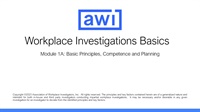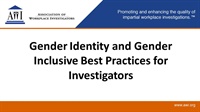Promoting and enhancing the quality of impartial workplace investigations.™

Credit available - Click Here for more information

Credit available - Click Here for more information

Credit available - Click Here for more information

Credit available - Click Here for more information

Credit available - Click Here for more information

Credit available - Click Here for more information

Credit available - Click Here for more information

Credit available - Click Here for more information

Credit available - Click Here for more information

Credit available - Click Here for more information
Please wait ...